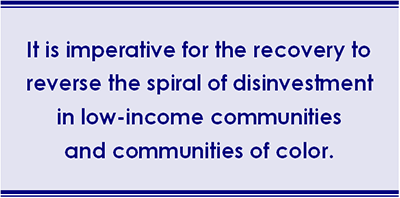You can also view this newsletter as a PDF.

Pandemic and Recession Reshape California Budget
The human and emotional toll caused by the COVID-19 pandemic cannot be understated. Yet the recession accelerated by the pandemic is contributing to economic and emotional distress as well. While some observers note the May jobs report brought some welcomed news, the national, state, and regional economies are in deep recession, with dire consequences for state and local government budgets. The economic fallout from COVID-19 is expected to result in state budget shortfalls totaling $615 billion for the state fiscal year ending June 30, the new fiscal year beginning July 1, and the subsequent fiscal year, according to the Center on Budget and Policy Priorities. California comprises a significant portion of the states’ shortfall: $54 billion.
Closing the Budget Gap
The Legislature passed a placeholder budget on June 15. Legislative negotiations on specific budget details extended beyond that date, culminating in Governor Gavin Newsom on June 29 signing the $202.1 billion spending plan for the 2020-21 fiscal year. The 2020 Budget Act addresses the $54 billion budget gap by drawing down reserves in the Rainy Day Fund, the Safety Net Reserve, and the Public School System Stabilization Account; funding reductions and deferrals that will be restored subject to additional federal funds received by October 15, such as funding for schools and state employees’ salaries; continued receipt of federal funds providing direct state General Fund relief; new revenues pursuant to temporary tax law changes; special funds borrowing, transfers, and deferrals; cancelled program and service expansions; and updated revenue and caseload assumptions.
Although the 2020 Budget Act primarily focuses on protecting public health, public education, and California’s most vulnerable communities, the need for sustained federal financial assistance points to the depth of the shortfall. Economic recovery has been complicated by the health and safety challenges of the COVID-19 pandemic. However, the federal government and states can do more to support economic recovery with these health and safety concerns in mind. The 2020 Budget Act begins to do so by providing state assistance for loan-loss mitigation, reducing the cost of capital for small businesses to address federal assistance program deficiencies, and expanding the $800 minimum franchise tax for small business creation.
Uncertainties Loom Large
 The reopening of economies has encouraged public gatherings that have contributed to rising numbers of COVID-19 cases. The pandemic is far from over, and health and safety must be prioritized as the paramount criterion for expanded opening of businesses and other venues. Ongoing impacts on the state’s economy and budget are certain.
The reopening of economies has encouraged public gatherings that have contributed to rising numbers of COVID-19 cases. The pandemic is far from over, and health and safety must be prioritized as the paramount criterion for expanded opening of businesses and other venues. Ongoing impacts on the state’s economy and budget are certain.
California’s unemployment rate drop from 16.4 percent in April to 16.3 percent in May brought some optimism. However, seeing one in six Californians unemployed today indicates the economy plunged deeply from a year ago, when one in 25 Californians was unemployed. Of particular concern, half of the job losses between February and April occurred in two sectors characterized by low wages: leisure and hospitality, and retail.
The expiration of federal supplemental unemployment insurance benefits at the end of July, the potential lifting of eviction moratoria, and the drying up of additional financial assistance for small businesses will exacerbate an already distressed economy and, most importantly, strip livelihoods away from millions of Americans.
From a budgetary standpoint, most states – including California – will be monitoring the strength of tax receipts not only this July, but in coming years when the lagging effects of the pandemic and recession will appear. The push by states for additional federal financial relief will continue. As of June 30, demands for federal action to provide additional COVID-19 relief as U.S. caseloads surge to their highest levels have yet to receive a bipartisan response. A repeal of the Affordable Care Act most certainly would wreak havoc on state budgets, especially during a pandemic that has disproportionately affected low-income communities, communities of color, and those with existing chronic health conditions.
Amidst this uncertainty, Governor Newsom declared a Budget Emergency on June 25, clearing the way for resources in the Rainy Day Fund to be drawn to meet the public health crisis. The State Controller’s Office will closely monitor these and other developments for their impacts on the state’s cash position.
Focus on Economic Recovery Critical
The Governor’s Task Force on Business and Jobs Recovery has pushed the U.S. Congress and President to unveil a $1 trillion-plus comprehensive infrastructure package to provide strategic investments in areas such as clean energy, digital connectivity, and housing. In the absence of federal action, the task force is moving forward on a state plan to tackle the immediate recovery, leveraging positive change by looking to the capital markets, infrastructure, and longer-term job recovery.
Additionally, the Legislature is deliberating general obligation bond measures with an eye towards job creation. It is imperative that California policymakers focus on economic recovery as they continue to meet the state’s budget challenges, seeking opportunities for the recovery to be equitable and reverse the spiral of disinvestment in low-income communities and communities of color.